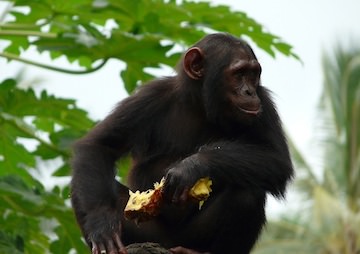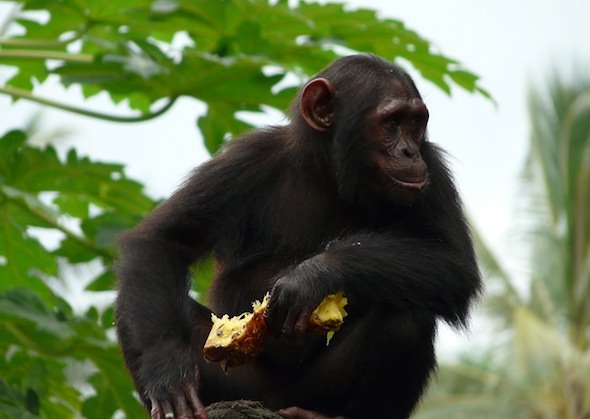Chimps’ Survival Hopes Jeopardized by Climate Change
One of our closest animal relatives is at risk of being wiped out as changing rainfall patterns threaten to destroy its Central African habitat.
By Tim Radford, Climate News Network

An endangered chimpanzee, rescued from animal trafficking and now at a wildlife center in Cameroon. Photo by Paul Sesink Clee/Drexel University
This Creative Commons-licensed piece first appeared at Climate News Network.
LONDON — Climate change is a challenge for chimpanzees, too. New research warns that a primate subspecies — one of humanity’s closest animal relatives — could become endangered within five years.
The threatened subspecies of the common chimpanzee is Pan troglodytes ellioti, and there are only 6,000 remaining individuals, surviving in two populations in Cameroon.
Field biologist Paul Sesink Clee, of Drexel University, US, and colleagues report in BMC Evolutionary Biology that they combined climate, environmental and population data to model how the chimpanzees’ preferred habitats would change with climate under a “business as usual” scenario in which the world went on burning fossil fuels.
Habitat change
Underlying such research is the larger question of how variation in habitat drives evolutionary change: why are there four subspecies of chimpanzee, and how much does geography and habitat have to do with it?
So the scientists made a chimpanzee population map, and imposed it on a map of habitats.
They found two distinct populations of the chimpanzee — one in the mountainous rainforests of western Cameroon, and one in a distinctive region of grassland, forest and woodland in central Cameroon.
Then they simulated how these habitats would change under global warming scenarios by 2020, 2050 and 2080.
“Preliminary projections suggest that rainfall patterns will change dramatically in this region of Africa”
Their findings were that the mountain rainforest habitat would survive, but the lowland dwellers would decline quickly under all scenarios by 2020, and could disappear almost entirely under the worst case scenario by 2080.
Since half of the entire population of Nigeria-Cameroon chimpanzees survive in this habitat, the suggestion is that the chimpanzees are particularly vulnerable to climate change.
Severely affected
The researchers did not take into account the opportunities for the chimpanzees to migrate, or to adapt to new circumstances. They point out that Central Africa in particular, and the continent in general, is likely to be severely affected by climate change.
“Preliminary projections suggest that rainfall patterns will change dramatically in this region of Africa, which will result in significant alterations of forest and savanna habitats,” the report says.
“Models of global climate change also have been used to show that 30% of plant and animal species are at risk of extinction if the rise in mean global temperature exceeds 1.5°C — an increase that is nearly certain to occur under future climate scenarios.”
Your support matters…Independent journalism is under threat and overshadowed by heavily funded mainstream media.
You can help level the playing field. Become a member.
Your tax-deductible contribution keeps us digging beneath the headlines to give you thought-provoking, investigative reporting and analysis that unearths what's really happening- without compromise.
Give today to support our courageous, independent journalists.






You need to be a supporter to comment.
There are currently no responses to this article.
Be the first to respond.